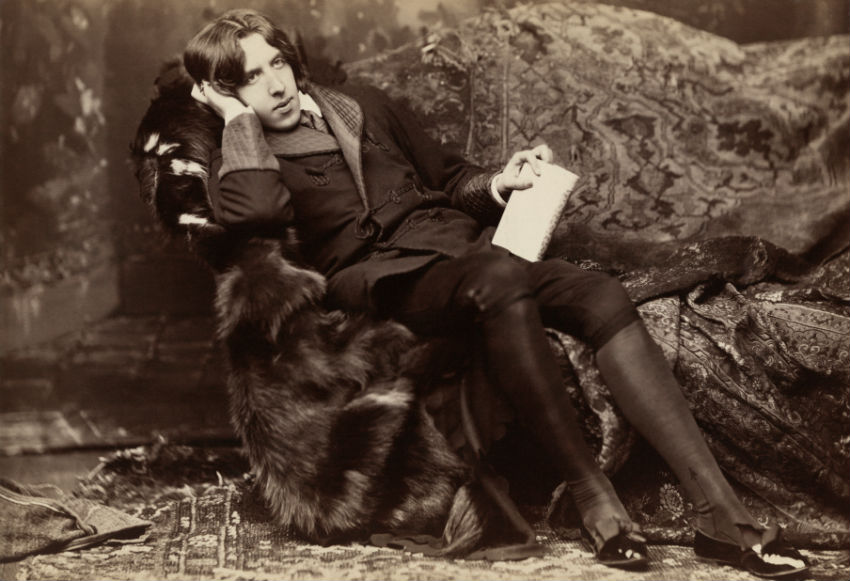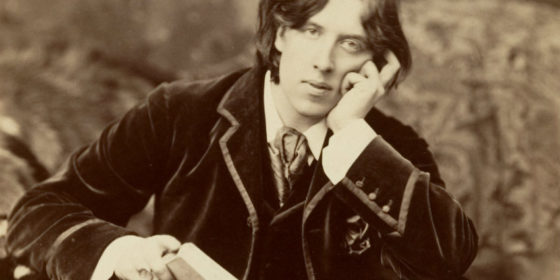New movie, The Happy Prince, focuses on the final couple of years of the life of Oscar Wilde. Directed and starring Rupert Everett in the title role, the critically acclaimed film highlights a chapter of Wilde’s life that other biopics have overlooked.
However, for some viewers, the name Oscar Wilde will be unfamiliar. Who was he and why is he considered such a queer icon?
Early years
Playwright, poet, author and raconteur, Oscar Wilde is one of the most famous writers to emerge from Ireland.
He was born in 1854 in Dublin to Anglo-Irish parents, and showed precocious talent from an early age – learning to speak French and German from his nannies while still a child. He attended Dublin University and then Oxford, before settling in London.
Wilde was an early adopter of ‘aestheticism’ – a philosophical and artistic movement that prized the beauty of things over politics. He wrote essays on the movement and embarked on lecture tours of the US and Canada.
His wit and writing earned him a name, and his flamboyant attire became something of a trademark. He became known in later life for wearing a (dyed) green carnation in his buttonhole.
He made little secret of loving the attention his reputation brought him. ‘There is only one thing in the world worse than being talked about, and that is not being talked about,’ is a typically Wildean quote.
Golden years: ‘Never love anyone who treats you like you’re ordinary’
His fame widened when he graduated from journalism, essays and poetry short stories, including The Happy Prince in 1888. He published his first and only novel, The Picture of Dorian Gray in 1890.
The story centered around a beautiful young man who sells his soul in exchange for living a moral-free, permanently youthful life. Rather than ageing, a portrait of himself that he keeps hidden appears to grow old and grotesque instead.
The novel’s publication marked the start of Wilde’s five-year, golden heyday. Already moving in London’s most fashionable societal circles, Wilde became one of the best known personalities of the age.
His fame arrived just as the new medium of photography surged in popularity. Some regard him as the first true celebrity of the modern age.

Oscar Wilde, aged 27, photographer in New York City in 1882 (Photo: Napoleon Sarony | Public Domain)
The Picture of Dorian Gray was followed by the play, Salome (1891) about the daughter of King Solomon who ordered the beheading of John The Baptist. Wilde wrote in it French while in Paris.
The play was performed in France, bringing him fame across the Channel, but it wasn’t performed in England due to laws prohibiting plays on Biblical subjects.
Wilde followed this in quick succession with his most famous plays: Lady Windermere’s Fan (1892), A Woman of No Importance (1893), and An Ideal Husband (1894) – all of them hits in London and frequently revived today.
All poked fun at certain elements of Victorian society and manners, but at the same time made audiences think about class, acceptance and societal transgressions.
Sexuality: ‘I can resist anything except temptation’
Oscar Wilde had romantic relationships with women when younger, and met and married his wife, Constance Lloyd, in 1894. However, it was his attraction to men – at a time when homosexuality was considered an ‘unspeakable vice’ – that would ultimately prove his downfall.
Wilde’s sexuality was inevitably a matter of some discussion, even before his period of peak fame. On lecturing in the US on the appeal of astheticism and interior design, critics had questions his manliness. One paper suggested his chosen attire and the subject of his lectures was more a bid for notoriety than a serious philosophical statement.
It’s not known when he began sexual affairs with men, but is widely accepted that he had a sexual relationship with Canadian journalist and art critic, Robert Ross.
Ross met Wilde when he was just 17, in around 1886. According to one friend, Ross was already sure of his sexuality and determined to seduce the notorious Wilde. The two remained close friends for the rest of Wilde’s life.
However, it was Wilde’s relationship with another young man that was to see him end up involved in one of the most famous court cases of Victorian England.
Wilde became romantically involved from 1891 onwards with Lord Alfred Douglas (‘Bosie’). Then an undergraduate at Oxford, Douglas was the son of the Marquess of Queensbury, John Douglas. Douglas was a blunt, plain-speaking man’s man: he invented the Queensbury rules of boxing still observed today.
By modern standards, Bosie was something of a rich, spoilt twink. Wilde was rich and famous and indulged Bosie his every whim. The two became increasingly indiscreet about their friendship, until rumors about it reached the ears of Bosie’s father.
Downfall
Bosie’s father left a card at Wilde’s London club that called him a ‘posing sodomite’. Given the gossipy nature of the circles in which Wilde moved, this was tantamount to a libelous twitter slur today.
Against the advice of most of his friends and close associates, Wilde decided to sue Douglas Snr.
To escape the defamation charge, Douglas Snr had to prove his accusation was true.
He hired detectives to pry into Wilde’s private life to find evidence of his liaisons with other men. By the stage in his life, Wilde has also taken to sleeping with male prostitutes. Or ‘Sleeping with panthers’, as he referred to upper class men sleeping with prostitutes and working-class young men.
At the libel trial, Wilde entertained the public gallery with his typical witticisms. However, Douglas Snr’s evidence of Wilde’s ‘sodomite’ nature began to mount. When his lawyers revealed that they had a string of male prostitutes ready to appear in the dock to testify against Wilde, the writer was forced to drop his prosecution.
Bosie’s father was found not guilty of libel. However, given all that had emerged during the court case, Wilde was then arrested and charged with ‘sodomy’ and ‘gross indecency’. Any homosexual activity between men at the time was illegal.
Wilde again faced court and was found guilty. He received a sentence of two years hard labour in prison. This commenced 25 May 1895. He spent much of this sentence at Reading Gaol.
Victorian London immediately shunned him; his name a by-word for homosexual depravity and ‘the love that dare not speak its name.’
Exile and death
Upon his release from prison in 1897, Wilde immediately went to Europe. His wife made it clear that he would not be able to resume family life with her and their two boys. The shame of his trial and imprisonment was too great. His young sons even had their surname changed to avoid the stigma of the ‘Wilde’ name.
In Europe, Wilde drifted between France and Italy, where he briefly enjoyed resumed his relationship with Bosie. However, that fizzled out and an increasingly penniless and and lost Wilde found himself in Paris.
He died, after developing meningitis, in November 1900. He was 46. His tomb is located in Paris’ famous Père Lachaise Cemetery.
‘The love that dare not speak its name’
At the time of his prosecution, Oscar Wilde was the most high-profile man in the world to be charged with homosexual-related crimes.
Although he sought to distance himself from the charges against him, and claimed all his relationships with men were platonic, he did not denounce the idea of same-sex love.
Asked by the prosecutor at his trial, ‘What is “the love that dare not speak its name”?’, Wilde famously replied: ‘”The love that dare not speak its name” in this century is such a great affection of an elder for a younger man as there was between David and Jonathan, such as Plato made the very basis of his philosophy, and such as you find in the sonnets of Michelangelo and Shakespeare. It is that deep spiritual affection that is as pure as it is perfect.
‘… It is beautiful, it is fine, it is the noblest form of affection. There is nothing unnatural about it.’
See also







